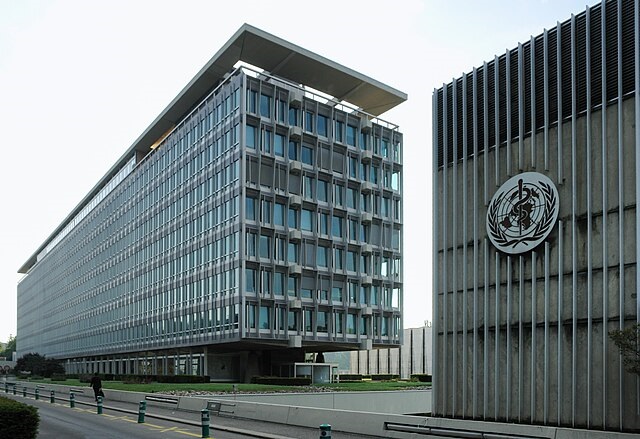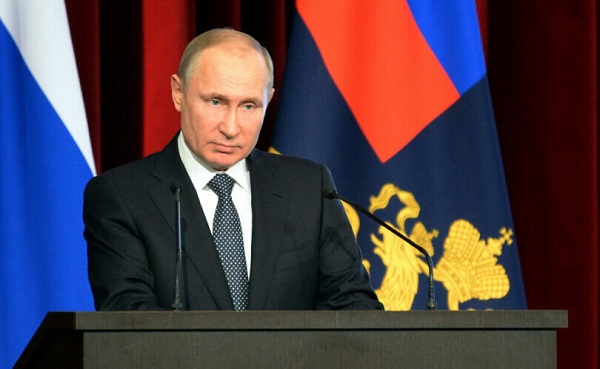Great Reset
The fundamental crisis with the WHO’s new international pandemic agreement

The WHO’s Managerial Gambit
From the Brownstone Institute
BY
The WHO is now proposing a new international pandemic agreement and amendments to the International Health Regulations. These proposals will make next time worse. Not because they override sovereignty, but because they will protect domestic authorities from responsibility. States will still have their powers. The WHO plan will shield them from the scrutiny of their own people.
On Friday, Bret Weinstein warned of impending tyranny from the World Health Organization. “We are in the middle of a coup,” the evolutionary biologist and podcaster told Tucker Carlson on X. The WHO’s new pandemic management regime will eliminate sovereignty, Weinstein said, and allow it to override national constitutions.
He’s right about tyranny and coups. But not about sovereignty or constitutions.
Technocrats learned a lot from Covid. Not how to avoid policy mistakes, but how to exercise control. Public authorities discovered that they could tell people what to do. They locked people down, closed their businesses, made them wear masks, and herded them to vaccination clinics. In some countries, people endured the most extreme restrictions on civil liberties in peacetime history.
The WHO is now proposing a new international pandemic agreement and amendments to the International Health Regulations. These proposals will make next time worse. Not because they override sovereignty, but because they will protect domestic authorities from responsibility. States will still have their powers. The WHO plan will shield them from the scrutiny of their own people.
Under the proposals, the WHO will become the directing mind and will of global health. It will have authority to declare public health emergencies. National governments will promise to do as the WHO directs. Countries will “undertake to follow WHO’s recommendations.” WHO measures “shall be initiated and completed without delay by all State Parties…[who] shall also take measures to ensure Non-State Actors [private citizens and domestic businesses] operating in their respective territories comply with such measures.” Lockdowns, quarantine, vaccines, surveillance, travel restrictions, and more will be on the table.
That sounds like a loss of sovereignty, but it is not. Sovereign states have exclusive jurisdiction in their own territory. WHO recommendations cannot be directly enforced in American courts. Sovereign nations can agree to follow the authority of international organizations. They can undertake to tie their own hands and to fashion their domestic laws accordingly.
The WHO proposals are a shell game. The scheme will provide cover to domestic public health authorities. Power will be ubiquitous but no one will be accountable. Citizens will lack control over the governance of their countries, as they already do. The danger that confronts us is still our own sprawling discretionary administrative state, soon to be boosted and camouflaged by an unaccountable international bureaucracy.
When countries make treaties, they make promises to each other. International law may regard those promises as “binding.” But they are not binding in the same sense as a domestic contract. International law is a different animal from domestic law. In Anglo-American countries, the two legal systems are distinct.
International courts cannot enforce treaty promises against unwilling parties in the same way that a domestic court can enforce contractual promises. International law is formalized international politics. Countries make promises to each other when it is in their political interests to do so. They keep those promises on the same criteria. When they don’t, political consequences sometimes follow. Formal legal consequences rarely do.
Nevertheless, the idea is to persuade the public that their governments must obey the WHO. Binding recommendations legitimize the heavy hands of domestic governments. Local officials will be able to justify restrictions by citing global duties. They will say that WHO directives leave them no choice. “The WHO has called for lockdowns, so we must order you to stay in your home. Sorry, but it’s not our call.”
During Covid, authorities tried to censor dissenting views. Despite their best efforts, skeptics managed to speak out. They offered alternative explanations in podcasts, videos, declarations, research papers, columns, and tweets. For many people, they were the source of sanity and truth. But next time things may be different. Under the new pandemic regime, countries will commit to censoring “false, misleading, misinformation or disinformation.”
As Weinstein put it, “Something is quietly moving just out of sight, in order that we will not have access to these tools the next time we face a serious emergency. … What [the WHO] wants are the measures that would have allowed them to silence the podcasters, to mandate various things internationally in a way that would prevent the emergence of a control group that would allow us to see harms clearly.”
The WHO documents will not override constitutions in Anglo-American countries. In the United States, the First Amendment will still apply. But the meaning of constitutions is not static. International norms can influence how courts read and apply constitutional provisions. Courts can take account of developing international standards and customary international law. The WHO proposals would not replace or define the meaning of constitutional rights. But they would not be irrelevant either.
The WHO is not undermining democracy. Countries have done that over time by themselves. National governments must approve the new plan, and any can opt out as they wish. Without their agreement, the WHO has no power to impose its dictates. Not all countries may be keen on all the details. The WHO proposals call for massive financial and technical transfers to developing countries. But climate change pacts do too. In the end rich countries embraced them anyway. They were keen to virtue-signal and justify their own climate boondoggles. Most can be expected to sign on to the WHO gambit too.
Countries who do so retain the sovereignty to change their minds. But leaving international regimes can be hellishly difficult. When the UK belonged to the European Union, it agreed to be subject to EU rules on all manner of things. It remained a sovereign country and could decide to get out from under the EU’s thumb. But Brexit threatened to tear the country apart. Having the legal authority to withdraw does not mean that a country is politically able to do so. Or that its elites are willing, even if that’s what its people want.
Numerous critics have made the same allegations as Weinstein, that the WHO’s regime will eliminate sovereignty and override constitutions. Brownstone writers have done so, for example, here and here. These allegations are easy to dismiss. Tedros Adhanom Ghebreyesus, the Director-General of the WHO, has repeatedly said that no country will cede sovereignty to the WHO. Reuters, the Associated Press, and other mainstream news outlets have done “fact checks” to debunk the claim. Saying that the WHO will steal sovereignty allows critics to be discredited as conspiracy theorists. It distracts from the game that is afoot.
The WHO proposals will protect power from accountability. National governments will be in on the plan. The people are the problem they seek to manage. The new regime will not override sovereignty but that is small comfort. Sovereignty provides no protection from your own authoritarian state.
Great Reset
Surgery Denied. Death Approved.

Canada’s assisted-death regime has reached a point most people assumed was dystopian fiction and it’s doing so with bureaucratic calm. A woman in Saskatchewan, Jolene Van Alstine, suffering from a rare but treatable parathyroid disease, has applied for MAiD not because she is dying, but because she can’t access the surgery that would let her live.
Read that again. Not terminal. Not untreatable. Just abandoned by a system that has the audacity to call itself “universal.”
Kelsi Sheren is a reader-supported publication.
To receive new posts and support my work, consider becoming a free or paid subscriber.
Her assisted death is scheduled for January 7, 2026.
And the country shrugs. Van Alstine described spending years curled on a couch, nauseated, in agony, isolated, and pushed past endurance. The disease is brutal, but treatable a surgery here, a specialist there. The kind of medical intervention that in a functional system wouldn’t even make the news.
But in Saskatchewan? There are no endocrinologists accepting new patients. Without one, she can’t get referred. Without a referral, she can’t get surgery. Without surgery, she loses her life either slowly through suffering, or quickly through state-sanctioned death.
If you’ve ever lived through pain that warps time…
If you’ve ever had your mind hijacked by trauma…
If you’ve ever stared down suffering with no end in sight…
You know how thin the line can get between endurance and surrender.
And that’s why this story hits differently: it reveals how fragile people become when the system meant to protect them becomes an accomplice in their despair.
Canada frames MAiD as empowerment. As compassion. As choice.
But choice is only real when the alternatives are viable.
If your options are slow agony or assisted death, that’s not autonomy it’s coercion with a friendly tone.
Disability advocates, chronic-pain patients, the elderly, and low-income Canadians have been sounding the alarm for years: MAiD is expanding faster than support systems can catch up. Every expansion widens the chasm between the rhetoric of compassion and the lived experience of those who actually need help.
The Canadian Human Rights Commission itself warned that MAiD is being accessed because people cannot get the services required to live with dignity. And dignity matters. Anyone who has lived on the edge knows this: humans don’t just need survival, we need a reason to keep surviving.
When the healthcare system withholds that, death can look like mercy. This is the part polite society doesn’t want to confront.
Canada’s healthcare system is collapsing. Not strained. Not overburdened. Collapsing.
We have a growing list of citizens choosing death because medicine has become a lottery →
• a quadriplegic woman who applied for MAiD because she couldn’t secure basic home-care support
• veterans offered MAiD instead of trauma treatment
• homeless Canadians considering MAiD because they can’t survive winter
And now a woman denied a simple, lifesaving surgery.
At some point, we have to call this what it is: a nation outsourcing its failures to death. I’ve sat with veterans who couldn’t find themselves inside their own minds after war. I’ve watched people suffer silently because bureaucracy didn’t move fast enough to keep up with their pain.
I’ve coached clients who were one dropped ball, one missed appointment, one shut door away from losing the will to fight.
The lesson is the same every time. People don’t break because they’re weak. People break because they’re left alone with their suffering.
Van Alstine wasn’t offered community.
She wasn’t offered care.
She was offered an exit.
And she took it.
Not because she wanted to die but because Canada didn’t give her any path to live.
We need to stop pretending this is compassionate. Compassion is presence. Compassion is support. Compassion is a surgeon who actually exists, a referral that actually happens, a system that catches someone before they fall into the dark.
If MAiD is going to exist, it must be the last, quiet, grave option not the discounted aisle Canada sends you to when the cost of real care is too high.
A society reveals its soul by how it treats the people who can’t fight for themselves.
Right now, Canada is revealing something hollow.
People will debate the ethics of assisted dying forever. Fine. Debate it. But this is the wrong battleground. The real question is this →
What does it say about a country when death is easier to access than medical care?
Until Canada answers that honestly, we’re going to see more names on the calendar scheduled deaths, stamped and approved — for people who didn’t want to die. They just wanted someone to give them a chance to live.
Canada has failed every single citizen, and not a single person seems to care.
KELSI SHEREN
– – – – – – – – – – – –
SOURCE: https://righttolife.org.uk/
– – – – – – – – – – – –
One Time Donation! – Paypal – https://paypal.me/
Buy me a coffee! – https://buymeacoffee.com/
Let’s connect!
Youtube – https://www.youtube.com/@
Substack: https://substack.com/@
TikTok – https://x.com/KelsiBurns
Business
The EU Insists Its X Fine Isn’t About Censorship. Here’s Why It Is.

Europe calls it transparency, but it looks a lot like teaching the internet who’s allowed to speak.
|
When the European Commission fined X €120 million on December 5, officials could not have been clearer. This, they said, was not about censorship. It was just about “transparency.”
They repeat it so often you start to wonder why.
The fine marks the first major enforcement of the Digital Services Act, Europe’s new censorship-driven internet rulebook.
It was sold as a consumer protection measure, designed to make online platforms safer and more accountable, and included a whole list of censorship requirements, fining platforms that don’t comply.
The Commission charged X with three violations: the paid blue checkmark system, the lack of advertising data, and restricted data access for researchers.
None of these touches direct content censorship. But all of them shape visibility, credibility, and surveillance, just in more polite language.
Musk’s decision to turn blue checks into a subscription feature ended the old system where establishment figures, journalists, politicians, and legacy celebrities got verification.
The EU called Musk’s decision “deceptive design.” The old version, apparently, was honesty itself. Before, a blue badge meant you were important. After, it meant you paid. Brussels prefers the former, where approved institutions get algorithmic priority, and the rest of the population stays in the queue.
The new system threatened that hierarchy. Now, anyone could buy verification, diluting the aura of authority once reserved for anointed voices.
Reclaim The Net is sustained by its readers.
Your support fuels the fight for privacy, free speech and digital civil liberties while giving you access to exclusive content, practical how to guides, premium features and deeper dives into freedom-focused tech.
Become a supporter here.
However, that’s not the full story. Under the old Twitter system, verification was sold as a public service, but in reality it worked more like a back-room favor and a status purchase.
The main application process was shut down in 2010, so unless you were already famous, the only way to get a blue check was to spend enough money on advertising or to be important enough to trigger impersonation problems.
Ad Age reported that advertisers who spent at least fifteen thousand dollars over three months could get verified, and Twitter sales reps told clients the same thing. That meant verification was effectively a perk reserved for major media brands, public figures, and anyone willing to pay. It was a symbol of influence rationed through informal criteria and private deals, creating a hierarchy shaped by cronyism rather than transparency.
Under the new X rules, everyone is on a level playing field.
Government officials and agencies now sport gray badges, symbols of credibility that can’t be purchased. These are the state’s chosen voices, publicly marked as incorruptible. To the EU, that should be a safeguard.
The second and third violations show how “transparency” doubles as a surveillance mechanism. X was fined for limiting access to advertising data and for restricting researchers from scraping platform content. Regulators called that obstruction. Musk called it refusing to feed the censorship machine.
The EU’s preferred researchers aren’t neutral archivists. Many have been documented coordinating with governments, NGOs, and “fact-checking” networks that flagged political content for takedown during previous election cycles.
They call it “fighting disinformation.” Critics call it outsourcing censorship pressure to academics.
Under the DSA, these same groups now have the legal right to demand data from platforms like X to study “systemic risks,” a phrase broad enough to include whatever speech bureaucrats find undesirable this month.
The result is a permanent state of observation where every algorithmic change, viral post, or trending topic becomes a potential regulatory case.
The advertising issue completes the loop. Brussels says it wants ad libraries to be fully searchable so users can see who’s paying for what. It gives regulators and activists a live feed of messaging, ready for pressure campaigns.
The DSA doesn’t delete ads; it just makes it easier for someone else to demand they be deleted.
That’s how this form of censorship works: not through bans, but through endless exposure to scrutiny until platforms remove the risk voluntarily.
The Commission insists, again and again, that the fine has “nothing to do with content.”
That may be true on a direct level, but the rules shape content all the same. When governments decide who counts as authentic, who qualifies as a researcher, and how visibility gets distributed, speech control doesn’t need to be explicit. It’s baked into the system.
Brussels calls it user protection. Musk calls it punishment for disobedience. This particular DSA fine isn’t about what you can say, it’s about who’s allowed to be heard saying it.
TikTok escaped similar scrutiny by promising to comply. X didn’t, and that’s the difference. The EU prefers companies that surrender before the hearing. When they don’t, “transparency” becomes the pretext for a financial hammer.
The €120 million fine is small by tech standards, but symbolically it’s huge.
It tells every platform that “noncompliance” means questioning the structure of speech the EU has already defined as safe.
In the official language of Brussels, this is a regulation. But it’s managed discourse, control through design, moderation through paperwork, censorship through transparency.
And the louder they insist it isn’t, the clearer it becomes that it is.
|
|
|
|
Reclaim The Net Needs Your
With your help, we can do more than hold the line. We can push back. We can expose censorship, highlight surveillance overreach, and amplify the voices of those being silenced.
If you have found value in our work, please consider becoming a supporter.
Your support does more than keep us independent. It also gives you access to exclusive content, deep dive exploration of freedom focused technology, member-only features, and practical how-to posts that help you protect your rights in the real world.
You help us expand our reach, educate more people, and continue this fight.
Please become a supporter today.
Thank you for your support.
|
-

 Media2 days ago
Media2 days agoThey know they are lying, we know they are lying and they know we know but the lies continue
-

 Focal Points2 days ago
Focal Points2 days agoThe West Needs Bogeymen (Especially Russia)
-

 Censorship Industrial Complex2 days ago
Censorship Industrial Complex2 days agoUS Condemns EU Censorship Pressure, Defends X
-

 Dan McTeague2 days ago
Dan McTeague2 days agoWill this deal actually build a pipeline in Canada?
-

 Bruce Dowbiggin24 hours ago
Bruce Dowbiggin24 hours agoWayne Gretzky’s Terrible, Awful Week.. And Soccer/ Football.
-

 Focal Points1 day ago
Focal Points1 day agoCommon Vaccines Linked to 38-50% Increased Risk of Dementia and Alzheimer’s
-

 espionage1 day ago
espionage1 day agoWestern Campuses Help Build China’s Digital Dragnet With U.S. Tax Funds, Study Warns
-

 Banks2 days ago
Banks2 days agoTo increase competition in Canadian banking, mandate and mindset of bank regulators must change












